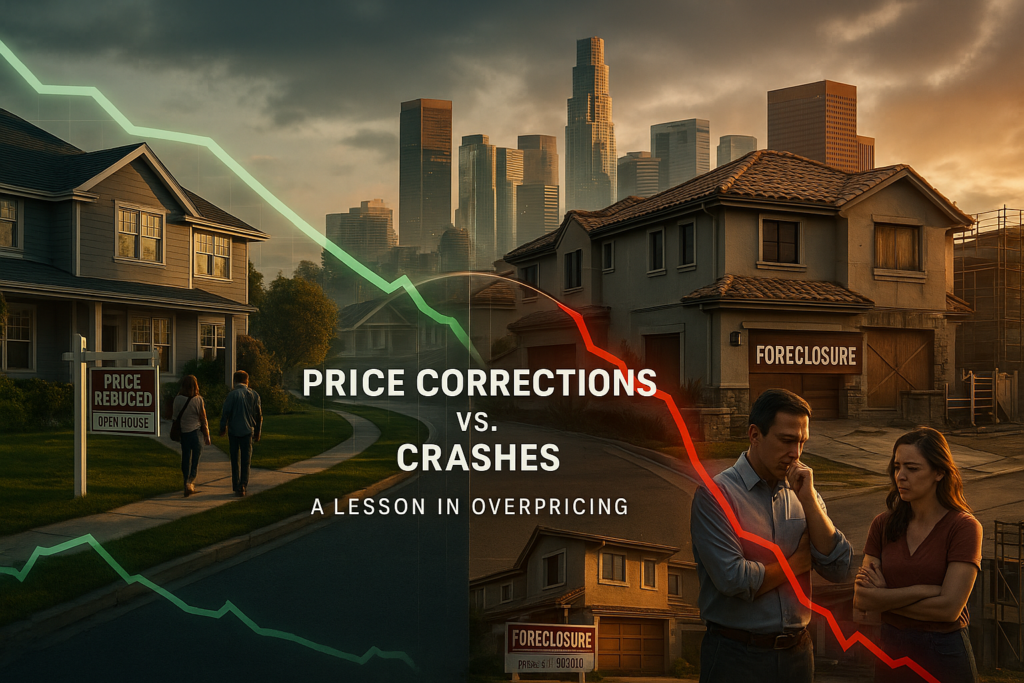
The Los Angeles housing market has been a rollercoaster these past few years, leaving many homeowners and prospective buyers asking anxious questions. Will the housing market crash in California, or will it just correct itself? Is Los Angeles on the verge of a housing bubble bursting, or are we simply experiencing a natural housing market correction? If you’ve been following real estate news in Los Angeles, you’ve likely seen conflicting headlines about Los Angeles housing market predictions – some warning of a looming crash, others suggesting a modest cool-down. It’s no surprise that terms like “when will the housing market crash again in California?” or “is the housing market bad right now?” are on everyone’s minds.
Tricia Watts, the owner of MaxNet Homes, often meets Los Angeles homeowners who share these worries. She emphasizes a straightforward but reassuring truth: real estate moves in cycles, and understanding those cycles can help you make informed decisions instead of panicking. In this post, we’ll break down what’s really happening in the LA housing market today, discuss whether a Los Angeles housing crash is likely, and explain why the market may just correct itself rather than collapse. We’ll also share the Los Angeles housing market forecast 2024 and beyond, using current data and expert insights to separate fact from fear.
By the end, you’ll have a clearer picture of the housing market in Los Angeles, California, and practical advice on how to navigate these trends – whether you’re looking to buy, sell, or simply hold tight. Let’s dive in.
Real Estate Cycles Are Natural (Even in Los Angeles)
No one likes uncertainty, especially not when it comes to Los Angeles housing prices. But it’s important to remember that ups and downs in the real estate market are normal. Real estate has always been cyclical. In fact, a housing market correction (basically a real estate market correction where prices level off or dip after a big run-up) is not the same as a catastrophic crash. It’s often a sign that the market is adjusting to ensure homes don’t get too overpriced.
Consider this: Los Angeles has gone through booms and busts in the past. Home prices surged in the 1980s, dipped in the early 1990s, skyrocketed in the mid-2000s, crashed during the 2008 financial crisis, then steadily climbed to new highs over the last decade. These cycles happen due to a mix of economic factors (like jobs, incomes, and interest rates) and human psychology. After years of rapid gains, a pause or slight pullback can actually be healthy. It helps prevent a true bubble by keeping prices in line with what buyers can afford.

The LA housing market today is coming off a period of unprecedented price growth (particularly during 2020–2021), so it’s reasonable to expect some cooling. But cooling isn’t crashing. Los Angeles housing market trends in late 2023 and 2024 show prices stabilizing rather than free-falling. In fact, recent data shows that as of April 2025, the median home sale price in Los Angeles was around $1,038,000, which is only about 0.7% lower than a year earlier. That tiny dip suggests a plateau, not a plunge. For context, even across Southern California as a whole, home prices were up roughly 1.9% year-over-year this spring – the slowest growth rate since 2023, but still growth, not a loss.
The takeaway? Cycles are natural. After years of rapid appreciation, a mild housing price correction can be a good thing. It lets incomes catch up and gives buyers a fighting chance. As Tricia Watts puts it, “Real estate isn’t meant to only go up in a straight line – and that’s okay.” Understanding this cyclical nature can keep you calm when headlines start screaming about a potential Los Angeles housing bubble or crash.
Market Uncertainty vs. True Crisis: Not Every Dip Is a Crash
It’s critical to distinguish between short-term uncertainty and a genuine market downturn. The housing market in Los Angeles can wobble due to events in the news or global economy without entering a full-blown crash. In other words, uncertainty is not the same as a fundamental market cycle turning downward.

For example, think back to late 2020 – an unusual time for everyone. Amid election changes and pandemic worries, the LA real estate market saw a brief slowdown. Buyers and sellers were hesitant, and you might have noticed a slight pricing dip in certain months. But that wasn’t a true cycle ending or the start of a collapse; it was a moment of pause driven by uncertainty. Sure enough, once things settled, the market rebounded quickly with prices accelerating again in 2021–2022.
We’re seeing a similar dynamic now. High mortgage rates and economic jitters have introduced uncertainty. Mortgage interest rates jumped from historic lows (around 3%) to about 6–7% in the past couple of years, drastically affecting what buyers can afford each month. This rate spike has understandably cooled demand and made people wonder, “Will the housing market crash in California because of this?” The reality: what we’re experiencing is more of a re-balancing. Sellers are adjusting to a world where not every home will fetch 10 offers within days. Buyers are more cautious because their borrowing costs are higher. This environment can make the market feel slow or “soft,” but it’s not a meltdown – it’s an adjustment.
Market uncertainty tends to be temporary. When people feel unsure (about the economy, jobs, world events, etc.), they often hit pause on big decisions like home purchases. That hesitation alone can cause a short-term dip in sales or even slight price declines. However, once the fog of uncertainty lifts – be it from stabilizing rates, clearer economic signals, or simply time passing – activity often picks right back up if the underlying fundamentals are sound. And in Los Angeles, many fundamentals remain solid. We still have a housing shortage in desirable areas, a huge population base, and a diversified economy. Those factors act as a cushion against a crash.
The key point: not every downward tick or slow month means we’re heading for a Los Angeles real estate crash. As Tricia Watts reminds clients, you have to zoom out. Is a dip caused by panic and headlines, or by true oversupply and economic distress? Right now, it seems to be the former. People are wary, but that wariness can actually create opportunities (as we’ll discuss next) rather than heralding doom.
Fear and Anxiety Can Create Opportunities
If you’re feeling anxious about whether the housing market is gonna crash, you’re not alone. Buyer sentiment has a huge impact on the market. Interestingly, when enough people get nervous and sit on the sidelines, the market can slow down — but that very slowdown can benefit those who remain active. In other words, your anxiety might lead to better deals for others who are ready to move forward.

Here’s how it works: Suppose a chunk of potential buyers decide to hold off because they’re worried prices will fall. Suddenly, sellers face less competition for their homes. A listing that might have had multiple bidders last year may now get just one or two offers, or maybe none at first. This shift gives the buyers who are in the market more negotiating power. They can make lower offers or request concessions that would have been unheard of in a bidding war. In recent months, for example, savvy buyers in Los Angeles have been able to negotiate price reductions or seller credits toward closing costs — deals that were rare during the frenzied peak of the market.
From the sellers’ perspective, this can be frustrating. If you’re trying to sell, a quieter housing market in LA means you need to position your home smartly to attract the remaining motivated buyers. But it doesn’t mean your home won’t sell; it just means buyers are choosier. Is the housing market bad right now? Not exactly — it’s just not as overheated as it was. In fact, many would argue this is a healthier environment. Homes are still selling, just with a bit more balance between buyers and sellers. In a strange way, the very fear of a housing correction helps bring about that correction gently, rather than an extreme crash.
For buyers who have been priced out or continually outbid in recent years, this calmer market is a window of opportunity. Prices have leveled off, and sellers (especially those who need to sell) are more open to negotiation. If you’re a buyer with your financing lined up, you might find that the home you loved at the start of 2022 (but couldn’t afford amid bidding wars) is now within reach in 2024. We’re hearing stories of buyers getting homes under asking price – something almost unheard of during the height of the boom.
The bottom line: Emotions drive a lot of real estate activity. When everyone is fearless and rushing in, we get bidding wars and sky-high prices. When everyone is fearful and holding back, the market slows and deals emerge. Rather than join the panic, try to see the silver lining. If you’re looking to buy, you may have more leverage now than you’ve had in years. If you’re a seller, don’t despair – there are still buyers out there, but you need to price realistically and make your home stand out. Tricia Watts has guided many clients through these ebbs and flows. She notes that keeping a level head is crucial. “The families who focus on their personal needs – who buy when it makes sense for them, or sell because it’s the right time for their life – tend to come out ahead in the long run,” Tricia says. Those who try to time the market perfectly often miss the best moments, because those moments are easiest to see in the rearview mirror.
Price Corrections vs. Crashes: A Lesson in Overpricing

Let’s tackle one of the biggest questions: Are house prices going down in California, or Los Angeles in particular? And if they are, is this a crash or just a correction? The answer requires a closer look at which prices are softening.
In a true housing market crash, you’d expect to see home values plummet across the board, quickly and steeply. Think 2008, when virtually every category of home saw prices tumble 20–50% in a short span. That kind of crash usually comes from a severe imbalance or crisis (like a wave of foreclosures or a burst credit bubble). In 2024, that’s not what we’re seeing in Los Angeles. Instead, we’re seeing a more nuanced home price correction – mainly affecting homes that were overpriced to begin with.
Over the past couple of years, some sellers (and their agents) overshot on pricing. You’ve probably seen those listings: a house that might normally be worth $950,000 listed at $1.2 million, hoping the red-hot market would fetch a miracle. In a feeding-frenzy market, a few of those moonshot prices actually found buyers. But now, with conditions calmer, buyers are far less willing (or able) to overpay. As a result, those over-ambitious listings are sitting unsold, and their asking prices are being slashed. A $1.2M listing drops to $1.1M, then $1.0M, until it finally aligns with reality. That’s a correction.
For instance, some high-end luxury homes in L.A. that tried to fetch record-breaking prices are now adjusting down. Maybe a developer listed a Beverly Hills spec mansion for $30 million when it really should’ve been $25 million. Such a property might wind up selling for closer to $25M or even $20M after many months on the market. That sounds like a huge drop, but keep in mind: at $20–25M it’s selling for exactly what it was truly worth in the first place. It’s the initial $30M expectation that was unrealistic.
Meanwhile, more “ordinary” homes – say a modest three-bedroom in the Valley or a starter condo in Culver City – if they were priced correctly from the start, they’re largely holding their value. Well-priced homes in good condition are still selling close to their list prices (and some even get multiple offers again if they tick all the right boxes like location and move-in readiness). So if you own a home and you’ve priced it reasonably based on recent comparable sales, you shouldn’t expect a fire sale situation. It’s the folks who were out of sync with the market that are feeling the correction most.
The data supports this story of a gentle landing rather than a crash. As mentioned earlier, Los Angeles home prices overall have barely budged year-over-year – about a 1% dip according to Redfin. And statewide, California’s median home price is actually forecasted to rise in 2024, not fall. In fact, the California Association of Realtors’ latest forecast projected around a 6.8% increase in the state’s median price for 2024, followed by a further 4% uptick in 2025. That’s certainly not a crash scenario – quite the opposite. It means that although some overheated segments are coming down to earth, the overall market is expected to keep gradually appreciating.
So when you hear about Los Angeles home prices dropping, dig deeper. Ask: which homes, and why? A widespread Los Angeles housing crash just isn’t backed by the numbers right now. But a housing correction – where the froth gets skimmed off the top – absolutely is.
For homeowners, the lesson is clear: pricing your property correctly is crucial, especially in a correcting market. If you overshoot, buyers will likely pass over your listing and it could languish. The longer a house sits on the market, the more “stale” it appears, and the lower the eventual offers tend to be. Price it right from day one, and you stand a much better chance of selling at a strong price even in a cooler climate. Tricia Watts often advises sellers, “Aim to be the best value on the block. If your neighbor is similar and asking $900,000, consider pricing at $889,000 to attract attention. You’ll often end up netting more in the end by avoiding a long wait and multiple price cuts.” In a market correction phase, intelligently priced homes will still sell close to fair value, whereas overpriced homes will chase the market down.
Why Today’s Market Won’t Likely Crash Like 2008
It’s natural to have flashbacks to 2008 when home values tanked, especially if you lived through that period in California. But there are key differences between then and now that make a real estate market crash in Los Angeles far less likely this time around. Understanding these factors can help ease your anxiety:
- Stricter Lending Standards: Back in the mid-2000s, it was far too easy to get a mortgage. Many people bought homes they truly couldn’t afford (remember “no-doc” loans and subprime mortgages?). Today, lending practices are much more stringent. Buyers have to verify income and meet higher credit standards, and a large share of homeowners locked in ultra-low 30-year fixed loans. This means fewer risky loans are out there to go bad. Will the real estate market crash again like in 2008? Unlikely, because we don’t have the same house-of-cards mortgage system undermining the market.
- Homeowner Equity Is High: In the early 2000s, people were using their homes like ATMs, and many ended up with little or no equity. When prices fell, they had negative equity and often walked away. Today, after a decade of price growth, Los Angeles homeowners as a whole have a significant equity cushion. Even if prices dip a bit, most folks still have plenty of value in their homes above what they owe. That makes a huge difference. Instead of a wave of foreclosures at the first sign of trouble, people now have the option to sell and still come out ahead. High equity levels act as a buffer against a crash.
- Low Inventory (Sellers Aren’t Forced to Sell): One big reason crashes happen is a flood of homes hitting the market (often due to foreclosures or desperate sellers), leading to oversupply. Right now, inventory in Los Angeles is relatively low. Many homeowners are “locked in” to ultra-low mortgage rates from a few years ago, so they’re not eager to sell and give up that cheap payment. This keeps supply in check. In fact, some data shows more owners have started listing homes as they accept higher rates are here to stay, but would-be buyers haven’t fully returned because rates remain high. The result is a more balanced market, not a glut. It’s hard to see a housing market crash in L.A. when there’s still a shortage of housing in many neighborhoods. We’d need a massive surplus of homes for sale to drive prices down dramatically, and we just don’t have that right now.
- Stable (Enough) Economy and Jobs: Southern California’s economy, while facing headwinds like everyone else, is not in freefall. Unemployment in Los Angeles hovers in the mid single-digits. We aren’t seeing mass layoffs on the scale that would force a huge number of homeowners into distress. Most homeowners who bought in recent years also had to fully document their income and assets, meaning they qualified for their loans and aren’t immediately at risk when things tighten. Unless we see a major recession with widespread job losses (which is possible but not the baseline forecast), we’re unlikely to see the kind of forced selling that characterized the last crash.
All these factors indicate that while a housing correction can happen (and indeed is happening in a modest way), a dramatic crash would require a perfect storm of negative events that just aren’t present now. Yes, if a severe recession hit or if interest rates shot up to, say, 10% overnight, the outlook might change. But barring such extremes, the conditions in 2024–2025 are very different from those in 2007–2008.
This doesn’t mean home prices can’t dip at all – they might, especially in a few overheated pockets or if sellers hold out too long and then rush the market. But those waiting and wondering when the real estate market will crash again may be waiting a long time. Most experts simply don’t see a 2008-style scenario on the horizon. Instead, they foresee something more akin to a soft landing: the market catching its breath, maybe rolling back a little in spots, then eventually moving forward again.
Los Angeles Housing Market Forecast for 2024 and Beyond

So what do the experts say about the Los Angeles real estate forecast for 2024 and the next few years? In a nutshell: a continued cooling-off period, but not a dramatic decline. Think of it as the market catching its breath, not having a heart attack. Here are some key predictions and trends:
- Home Prices: Multiple forecasts (from Zillow, Redfin, and C.A.R. among others) predict that Los Angeles home prices will remain relatively flat or see slight single-digit percentage changes in 2024. In fact, as noted earlier, the California Association of Realtors expects a 6.8% rise in California’s median home price in 2024 (followed by another ~4% in 2025). Los Angeles, being a big chunk of the state’s market, is part of that story. So instead of a big drop, the Los Angeles housing market may just move sideways or inch up a bit overall. Some neighborhoods or high-priced segments could see small declines, while more affordable areas might still see modest gains. But nothing suggests a steep plunge across the board.
- Sales Activity: 2023 saw a slowdown in the number of homes sold, largely because many sellers and buyers were in a standoff (sellers wanted yesterday’s peak prices, buyers faced today’s higher rates). In 2024, experts anticipate sales volume might actually pick up slightly as expectations align. C.A.R. projected a notable increase in home sales in 2025 as more buyers and sellers return to the market. This implies that by late 2024 and into 2025, activity will strengthen. Life events will always drive real estate moves (new jobs, growing families, etc.), and as people adjust to the “new normal” of ~6-7% mortgage rates, more will choose to move despite the higher borrowing costs. We likely won’t return to the crazy turnover of 2021, but 2024 shouldn’t be a standstill either – think of it as a slow but steady thawing of activity.
- Interest Rates: A big wild card is mortgage rates. The consensus among many economists is that rates may gradually ease down in late 2024 or 2025 (perhaps into the low 6% or even high-5% range on 30-year fixed loans). The Federal Reserve’s fight against inflation will dictate a lot of this. If inflation keeps cooling, rate pressures should lessen. Even a one-point reduction in mortgage rates can bring a wave of buyers back into the market, since it significantly lowers monthly payments. On the other hand, if inflation surprises to the upside and rates stay high or climb further, that could dampen demand longer. For now, plan on rates in the mid-6% range, with a cautious optimism that they’ll be a bit lower by the end of 2024 than at the start.
- Rents and Investors: A side note on rentals – L.A. rents have been soaring. Over the past year, rents in Los Angeles jumped about 11%, reaching an average of roughly $2,644 per month. This high cost of renting can motivate some renters to become buyers (if they can scrape together a down payment), which provides underlying support for home prices. However, high rents also indicate ongoing affordability challenges in the city. Real estate investors will be weighing the strong rental yields against the higher cost of financing. Some small “mom and pop” landlords might choose to sell if they feel prices have plateaued, whereas bigger investors could actually be attracted by rising rents. In short, the rental market strength is a double-edged sword but certainly a factor in the broader housing equation.
- Possible Wildcards: The most commonly cited potential trigger for a bigger downturn would be an economic recession. If a significant recession hits the U.S. or California in 2024, that could temporarily soften home prices more than currently expected (job losses = less buying power). Another wildcard is consumer sentiment – if people suddenly believe en masse that a crash is coming, that belief can become a self-fulfilling prophecy in the short term. Conversely, any policy changes (like new tax incentives for buyers or more housing supply initiatives) could boost activity. Keep an eye on broader economic news, but remember that real estate moves relatively slowly. We’re likely to see any major changes coming months in advance through indicators like inventory levels, days on market, and price reductions.
In summary, Los Angeles housing market predictions for 2024 foresee a year of normalization. The frenzy of 2021–2022 is behind us, and the feared crash of 2023 never materialized. Instead, we have a market that is finding its footing. Prices aren’t going to shoot through the roof nor hit rock bottom overnight. For buyers, this means you can proceed with more confidence that you won’t “overpay and then watch your home’s value collapse.” For sellers, it means you may need a bit more patience and a savvy strategy, but well-presented homes will sell. We’re entering a phase where neither side holds all the cards – and that balance is a welcome change for many.
How to Navigate a Correcting Market: Tips for Buyers and Sellers
Whether you’re worried “will the housing market ever crash?” or simply wondering about “when will the housing market correct?”, trying to time the market can be a stressful (and often futile) exercise. Instead, focus on what you can control. Here are some tips to help you succeed in the current Los Angeles market, whether you’re buying, selling, or just planning your next move:
- Buy for the long term: If you find a home you love and can afford, consider grabbing it – even in a cooler market. In 5, 10, 20 years, a difference of a few percent on the purchase price likely won’t matter. Los Angeles real estate has historically trended up over the long haul. Minor price fluctuations today won’t make a dent in the big picture if you plan to hold the property. As one industry saying goes, “Don’t wait to buy real estate; buy real estate and wait.” The key is to buy within your means and with a long-term perspective. If you do that, you won’t lose sleep over short-term market wiggles.
- Sell smart, not scared: If you’re a homeowner thinking, “Should I sell my house now before a crash?”, take a breath. There’s no need to panic-sell in Los Angeles’ current market. However, do be smart about your sale. Price your home competitively based on recent comps (the last 2–3 months, not last year’s peak). Invest a little time in curb appeal and minor fixes to make a strong first impression. In a correcting market, the goal is to be the most attractive option for the price. If you list your property too high hoping for yesterday’s prices, you might end up sitting on the market and getting lowball offers later. Instead, set a fair price and be willing to negotiate. Many buyers are still out there – they just want to feel they’re getting a reasonable deal. Also, consider your Plan B: for example, MaxNet Homes can evaluate your home and give you a fair cash offer (often within 24 hours) so you can compare that option with a traditional sale. Having a fallback like a guaranteed cash offer can provide peace of mind in an uncertain market.
- Stay informed, not inflamed: There’s a lot of noise out there. Every week, some headline screams “housing market expected to crash” or “will the housing market go down in California?” – often based on worst-case scenarios or clickbait. It’s important to stay informed with real data rather than sensationalism. Keep an eye on trusted sources: How many homes are actually for sale in your area? Are prices being cut, and by how much? What are interest rates doing? By following Los Angeles real estate market news and updates from credible outlets, you can ground your decisions in facts. This will help you avoid getting swept up in fear. Remember, bad news sells – but that doesn’t mean it’s likely news. Balance the doom-and-gloom with on-the-ground reality.
- Have a contingency plan: If you do need to sell due to personal reasons but you’re worried about market conditions, prepare a backup plan. You might list your home with a trusted agent and simultaneously reach out to a company like MaxNet Homes to see what a direct cash sale could look like. There’s no harm in exploring multiple avenues. Maybe your home will sell on the open market at a great price – fantastic. But if it doesn’t, knowing you can get a guaranteed cash offer (without fees or lengthy escrow delays) can be a stress-reliever. We’ve worked with homeowners in L.A. who were on tight timelines (job relocations, inherited properties, etc.), and having that cash buyer option ready allowed them to move forward confidently, housing crash or not.
- Don’t try to “time” the absolute bottom or top: It’s tempting to strategize like a stock trader – “I’ll sell at the top, then rent and buy again at the bottom” or “I’ll wait to buy at the absolute bottom price.” The problem is, you only recognize tops and bottoms in hindsight. If you sell your home and prices keep rising, you might price yourself out waiting for a drop. If you wait to buy and the market only corrects slightly (or not at all), you could end up paying more later as interest rates or rents climb. The smarter approach for most people is to make moves based on life needs and affordability, not trying to outsmart the market cycles. Real estate is a long game. You’ll rarely hit a perfect bullseye on timing, but that’s okay – you don’t need to. As long as you make a sound decision given what you know today, you’ll be positioned to do well when you look back years down the road.
Conclusion: Will the Los Angeles Housing Market Crash or Correct Itself?

After examining the evidence and expert opinions, the answer becomes clear: the Los Angeles housing market is correcting, not crashing. Prices in LA have flattened out more than anything, and in some cases have gently rolled back from their all-time highs. But a dramatic free-fall — the kind of steep crash some people fear — appears unlikely given the current fundamentals. Instead, we have a market that is self-correcting: bloated prices are coming back to reality, and the market is finding a healthier equilibrium between buyers and sellers.
For homeowners and buyers, this should actually come as a relief. A correction can improve affordability and create opportunities, while preserving the long-term value growth that makes real estate such a powerful wealth builder. The market is effectively catching its breath, not bursting its bubble. If you’ve been sitting on the fence, paralyzed by the question “will the housing market ever crash?”, you can take comfort in knowing that what we’re seeing is a natural adjustment, not a nosedive into the abyss. Real estate in Los Angeles has proven its resilience time and again, and current trends suggest that resilience is still intact.
At MaxNet Homes, we believe in a straightforward and empathetic approach to these market shifts. Our founder, Tricia Watts, built this company on the principle of doing right by homeowners, even in uncertain times. We understand that selling a home can be stressful, especially when you’re bombarded with conflicting market narratives. That’s why our goal is to provide clarity, options, and support – never pressure. Whether the market is hot, cold, or somewhere in between, our focus is on helping you make the best decision for your situation.
If you’re considering selling your house in Los Angeles and want to discuss your options in this evolving market, we’re here to help. We’re happy to provide guidance or even a free, no-obligation cash offer for your home so you can see what your property might fetch without having to list it. Sometimes just knowing your home’s cash value can bring peace of mind in an uncertain market. Feel free to reach out via our contact us page or give us a call — the MaxNet Homes team is ready to answer your questions with honesty and transparency.
And if you’re not quite ready to make a move but want to stay informed, we invite you to explore more real estate insights on our MaxNet Homes blog. We regularly update it with Los Angeles real estate market news, homeowner tips, and expert advice from Tricia Watts and our team. Our aim is to be a resource you can trust, in good times and bad.
Remember: The housing market, like any market, will have its ebbs and flows. Don’t let short-term fluctuations derail your long-term plans. The Los Angeles market is adjusting itself, and in time, it will likely resume its upward climb (as it always has). Whether you’re buying or selling, keep a level head, lean on trusted professionals, and make the decisions that feel right for you. In the end, those are the moves that pay off – regardless of what the market is doing. Here’s to making informed, confident real estate decisions in 2024 and beyond!
Frequently Asked Questions
What will happen to the Los Angeles housing market?
The Los Angeles housing market is expected to cool but stay stable in 2024, with modest price adjustments — not a crash. That means it’s still a good time to sell your Los Angeles house fast, especially with serious buyers active.
Need to sell fast?
Contact MaxNet Homes for a fast cash offer for your LA home today.
Is there a housing crisis in Los Angeles?
There’s no housing crash in Los Angeles, but affordability and inventory challenges create pressure for many homeowners. If you need to sell your Los Angeles house fast, now is a smart time — before the market shifts further.
Want certainty?
Get a fast cash offer for your LA home — contact MaxNet Homes today.
Will housing prices crash in California?
A housing price crash in California is unlikely. Experts predict a market correction, not a collapse — with prices stabilizing in most areas. If you’re looking to sell your Los Angeles house fast, now may be the right time.
Need a quick, reliable option?
Get a fast cash offer for your LA home — contact MaxNet Homes today.
What is the housing market forecast for Los Angeles in 2025?
The Los Angeles housing market forecast for 2025 shows steady prices and moderate growth, not a crash. Experts expect a balanced market with ongoing demand and limited inventory. If you’re ready to sell your Los Angeles house fast, timing is still on your side.
Get started today — request a fast cash offer for your LA home from MaxNet Homes.
Is Los Angeles a buyers or sellers market?
Los Angeles is shifting toward a balanced market in 2024 — not strongly favoring buyers or sellers. Homes priced right still move quickly, so if you need to sell your Los Angeles house fast, now is a smart time.
Want a fast, hassle-free option?
Get a fast cash offer for your LA home from MaxNet Homes today.
Why are house prices so high in Los Angeles?
House prices in Los Angeles are high due to limited inventory, strong demand, and strict zoning laws that slow new construction. These factors keep prices elevated even in a cooling market.
Need to sell your Los Angeles house fast?
Get a fast cash offer for your LA home — contact MaxNet Homes today.
How bad is the California housing crisis?
The California housing crisis is serious, driven by high prices, low inventory, and limited affordability — especially in major cities like Los Angeles. Many homeowners are exploring ways to sell their Los Angeles house fast for flexibility.
Need options?
Get a fast cash offer for your LA home — contact MaxNet Homes today.
Are rents falling in Los Angeles?
Rents in Los Angeles have dipped slightly in some areas but remain among the highest in California due to strong demand and limited supply. If rising costs are impacting you and you need to sell your Los Angeles house fast, you have options.
Get a fast cash offer for your LA home — contact MaxNet Homes today.
Why are so many people homeless in Los Angeles?
Homelessness in Los Angeles is driven by a mix of high housing costs, limited affordable options, and economic hardship. With rent and home prices outpacing incomes, many struggle to stay housed.
Need to sell your Los Angeles house fast for financial relief?
Get a fast cash offer for your LA home — contact MaxNet Homes today.




